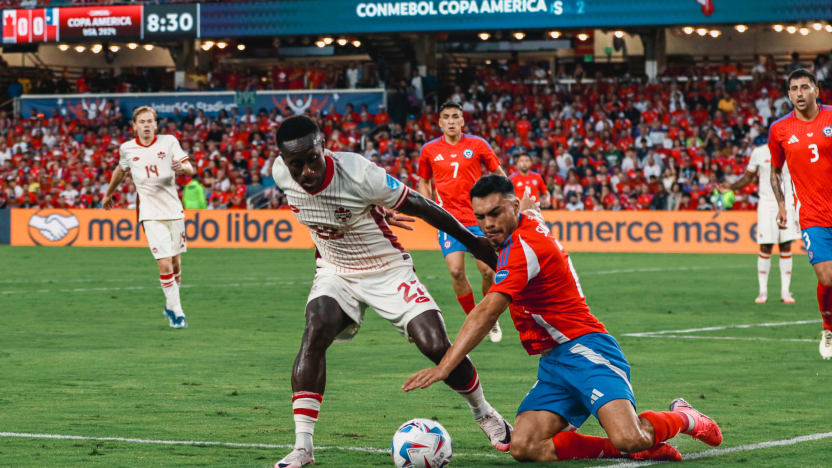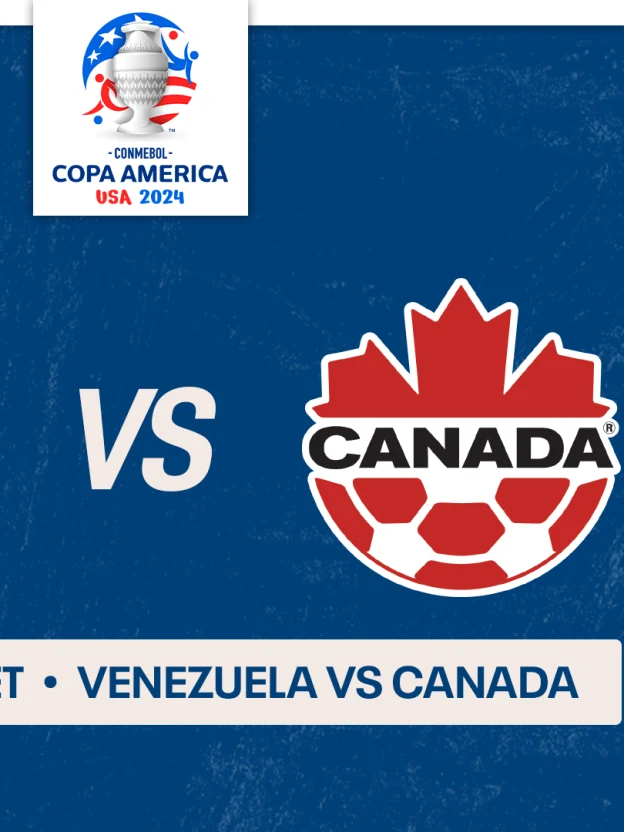Canada vs. Venezuela
Copa América 2024 — Quarter-Final
July 5, 2024 at 9 p.m. ET/6 p.m. PT
AT&T Stadium in Arlington, Texas
Canada’s first knockout round match at a Copa América will unfold this Friday night in Texas, where the men’s national team will try to take one more incredible step forward in the quarter-finals against Venezuela. It’s a contest that’s too close to call, between two sides both on an upward trajectory having surprised a few opponents in the group stage. Canada, of course, qualified as the second-place team in Group A with a 1-1-1 record, beating Peru and drawing 0-0 against Chile to eliminate the two more established CONMEBOL sides. Venezuela, meanwhile, were surprising winners of Group B. They went a perfect 3-0-0 in the group stage, beating Ecuador, Mexico and Jamaica — all three of which are ranked higher than Venezuela (54th) in the FIFA World Rankings. Canada, for the sake of context, sit 48th. This will be just the just the fifth ever appearance in the Copa América knockout stage for La Vinotinto, who have participated in all 20 tournaments since 1967. Their only ever knockout win was in 2011, when they won a quarter-final against Chile before bowing out to Paraguay on penalties in the semifinal. However, much like it is for Canada, this is an exciting new era for the Venezuelan team. Led by Argentine manager Fernando Batista, their team has a handful of rising stars, with 10 of their group aged 25 or younger. A few years ago, Venezuela were nowhere near the contenders they are now; they finished at the bottom of the CONMEBOL World Cup Qualifying table in 2022 with just 10 points. In fact, they’ve never qualified for a FIFA World Cup. However, that fact could be on its way to changing. After six matches in CONMEBOL qualifying for the 2026 World Cup, Venezuela are fourth with nine points, with wins over Paraguay and Chile and draws with Brazil, Ecuador and Peru. They’re the joint second-highest scoring team at this Copa América so far with six goals in the group stage, trailing only Uruguay. They’ve enjoyed solid depth of scoring, but leading the charge in attack is still — despite the youth around him — the country’s all-time leading scorer, Salomón Rondón, who has two goals so far this tournament to add to his prior total of 40 for his country. Joining Rondón in attack are players like Mazatlán winger Eduard Bello, who has also scored twice at this Copa, and a familiar face to some Canadian soccer fans in Yeferson Soteldo, the former Toronto FC forward now plying his trade in Brazil with Grêmio. Venezuela have pedigree at the back and in midfield too, like Girona midfielder Yangel Herrera or Real Sociedad fullback Jon Aramburu, who has been excellent in his first tournament at the age of 21. The only absence expected for Venezuela is winger Darwin Machís, who picked up two yellow cards in the group stage and will therefore serve a suspension.

Perhaps surprisingly, there is a little history between Canada and Venezuela. The sides have met twice — in 2007 and 2010, both friendlies — and each game ended in a draw. So, both teams will be looking for their first win over the other. Canada will be preparing for a different kind of test than they’ve seen under Jesse Marsch so far. While Venezuela might not have the top-class talent of Argentina or France, they have plenty of ways to be dangerous. Although they lack the experience of, for instance, Chile, they make up for that in energy. The pace of this match should be higher, with Venezuela offering more pace and directness. A faster game could suit Canada, who have shown before that they can thrive in transition, but they’ll have to be wary of getting caught too high up the pitch like they did against the Netherlands. There’s little reason to believe Marsch will change much in the Canadian lineup, although Ismaël Koné could come back into midfield after being dropped for the Chile game. Unfortunately, with Tajon Buchanan’s broken leg suffered a few days ago in training, he won’t be an option for Canada, who will more likely turn now to Liam Millar, Richie Laryea or Jacob Shaffelburg to join their attack — although the latter has been such an explosive weapon off the bench that it might be better to save him for later. A rematch with Argentina is what awaits Canada in the semi-finals if they’re able to get there, but doing so will be an incredibly difficult task. Although the Canadians have defended mostly very well in their five games now under Marsch — they’ve conceded in only two out of 10 halves — they haven’t been scoring very freely, with only one goal scored in those five. To get past Venezuela, the Canadians will likely need to find the net and make better use of any chances they create. It’s worth noting that knockout matches at this Copa América, unlike at tournaments like the Euros or World Cup, do not go to extra time if tied after 90 minutes, and would instead proceed straight to penalties. The bookmakers have this game at almost a coin flip. If Canada can open things up and find their scoring touch, then they could find themselves semi-final bound. If not, then it would instead be a famous night for Venezuela. Either way, it’ll be quite the spectacle in Texas.
PROJECTED LINEUPS
Canada: Crépeau; Johnston, Bombito, Cornelius, Davies; Millar, Eustáquio, Koné, Laryea; David, Larin
Venezuela: Romo; Aramburu, Y. Osorio, Ferraresi, Navarro; Martínez, Herrera; Bello, Savarino, Soteldo; Rondón
ALL-TIME SERIES
Canada wins: 0 || Venezuela wins: 0 || Draws: 2
Last meeting:
May 29, 2020 — Venezuela 1-1 Canada
MATCH OFFICIALS
Referee: Wilton Sampaio (BRA)
ARs: Bruno Pires (BRA), Bruno Boschilia (BRA)
4th Official: Juan Benítez (PAR)
VAR: Rodolpho Toski (BRA)
